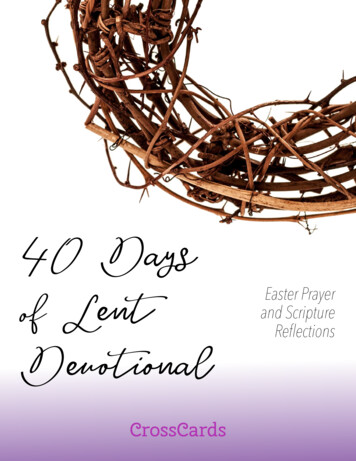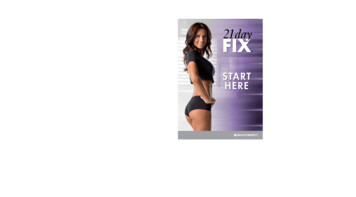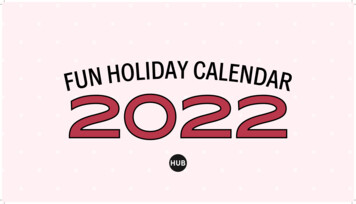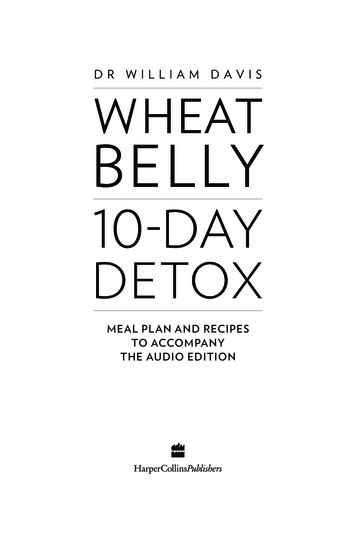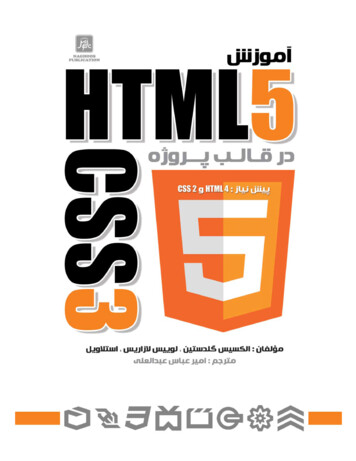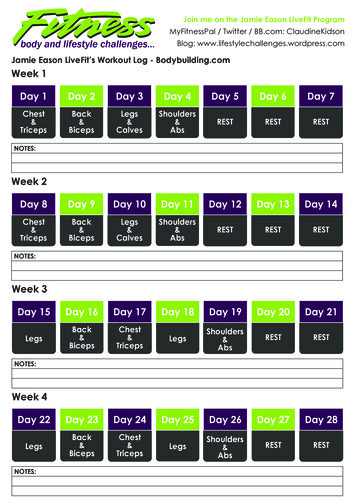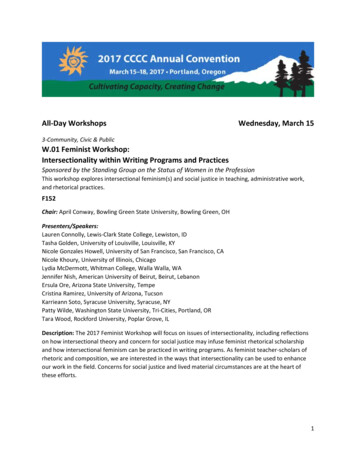
Transcription
All-Day WorkshopsWednesday, March 153-Community, Civic & PublicW.01 Feminist Workshop:Intersectionality within Writing Programs and PracticesSponsored by the Standing Group on the Status of Women in the ProfessionThis workshop explores intersectional feminism(s) and social justice in teaching, administrative work,and rhetorical practices.F152Chair: April Conway, Bowling Green State University, Bowling Green, OHPresenters/Speakers:Lauren Connolly, Lewis-Clark State College, Lewiston, IDTasha Golden, University of Louisville, Louisville, KYNicole Gonzales Howell, University of San Francisco, San Francisco, CANicole Khoury, University of Illinois, ChicagoLydia McDermott, Whitman College, Walla Walla, WAJennifer Nish, American University of Beirut, Beirut, LebanonErsula Ore, Arizona State University, TempeCristina Ramirez, University of Arizona, TucsonKarrieann Soto, Syracuse University, Syracuse, NYPatty Wilde, Washington State University, Tri-Cities, Portland, ORTara Wood, Rockford University, Poplar Grove, ILDescription: The 2017 Feminist Workshop will focus on issues of intersectionality, including reflectionson how intersectional theory and concern for social justice may infuse feminist rhetorical scholarshipand how intersectional feminism can be practiced in writing programs. As feminist teacher-scholars ofrhetoric and composition, we are interested in the ways that intersectionality can be used to enhanceour work in the field. Concerns for social justice and lived material circumstances are at the heart ofthese efforts.1
All-Day WorkshopsWednesday, March 15The day will include two panel presentations with discussions inspired by the each of presentations. Itwill extend into broader considerations of how to open up dialogue in a variety of spaces. The activitieswill encourage interaction between presenters and participants, in order provide opportunities to createa plan of action for the future, as well as allow space for mentoring and feedback on current academicprojects.Panel 1: Intersectional Feminist Practices and Ways of KnowingPanelists will discuss their own practices as feminist scholar–researchers, explore the intersections offeminist/disability theory/experience for women working in academia, the interconnected rhetorics ofdisclosure (disclosing children on the job market, disclosing pregnancy, disclosing marital status,disclosing disability, disclosing need for accommodation), and expose oppressive sexist/ableist barriersto being a working academic. They will also use intersectionality, and by extension a matrix lens, as ananalytical method to better understand how ethos is embodied to ultimately find that gender,race/class, and language significantly affect ethos construction by influencing access to specific genres,channels for circulation, and the effect of languagePanel 2: Intersectional Feminism and Social JusticeThis panel synthesizes work and testimonies of faculty women of color with the purpose of outliningstrategies for negotiating one's place within the academy. Of particular concern are the ways in whichfaculty women of color both combat and succumb to the academy's "crazy-making" space. They will alsoexamine the lives and writings of women incarcerated in the US juvenile justice system: a populationwhose intersectional experiences of oppression include race, gender, age, socioeconomic status,educational opportunity, and statistically high rates of trauma histories, mental illnesses, and learningdisabilities. The panelists will also address writing a feminist rhetorical history of Lolita Lebrón—the latePuerto Rican nationalist—whose advocacy addresses the long-lasting effects of colonialism and USimperialism. This research traces contemporary repercussions of the issues that Lebrón's social justicerhetoric meant to highlight. The presentation will demonstrate how feminist histories can be applied tocontemporary social justice rhetoric, specifically focusing on a Puerto Rican geopolitical perspective.2
All-Day WorkshopsWednesday, March 1510-ResearchW.02 Cultivating Research Capacity through International Exchanges aboutHigher Education Writing ResearchSponsored by the International Researchers’ Consortium Standing GroupThis is the International Researchers’ Consortium Standing Group workshop. Researchers from 24countries share drafts in advance and have extended dialogue in small groups for deep exchange aboutwriting research.A105Chairs:Christiane K. Donahue, Dartmouth, Hanover, NH, and Université de Lille III, Villeneuve-d'Ascq, FranceCinthia Gannett, Fairfield University, Fairfield, CTWorkshop Facilitators:Rula Baalbaki, American University of Beirut, Beirut, LebanonNancy Bou Ayash, University of Washington, SeattleYue Chen, Purdue University, West Lafayette, INVera Cristovão, Universidade Estadual de Londrina (UEL), Londrina, Paraná, BrazilLance Cummings, University of North Carolina, WilmingtonGita DasBender, Seton Hall University, South Orange, NJYinyin Du, Guangdong University of Foreign Studies, Guangzhou, Guangdong, ChinaLisa Emerson, Massey University, Palmerston North, New ZealandTyler Evans-Tokaryk, University of Toronto, Mississauga, CanadaPaula Abboud Habre, Lebanese American University, Beirut, LebanonAndrew Johnson, Monash University, Caulfield East, Victoria, AustraliaJay Jordan, University of Utah, Salt Lake CityXinfang Liu, Suzhou University of Science and Technology, Suzhou, Jiangsu, ChinaJennifer Lopera, Universidad del Rosario, Bogotá, ColombiaShurli Makmillen, Claiflin University, Orangeburg, SCMaria Ester Moritz, Universidade Federal de Santa Catarina, Florianópolis SC, BrazilElizabeth Narváez-Cardona, Universidad Autónoma de Occidente, Cali, ColombiaRaffaella Negretti, Chalmers Technical University, Göteborg, Sweden3
All-Day WorkshopsWednesday, March 15Lucy Rai, The Open University, Milton Keynes, EnglandLynne Ronesi, American University of Sharjah, Sharjah, United Arab EmiratesAndrea Scott, Pitzer College, Claremont, CAKirk St. Amant, Louisiana Tech University, RustonBrian Stone, California State Polytechnic University, PomonaKatja Thieme, University of British Columbia, Vancouver, CanadaBelinda Walzer, Northeastern University, Brighton, MAXiaobo Wang, Georgia State University, AtlantaMargaret Willard-Traub, University of Michigan, DearbornJuheina Fakhreddine Yakzan, American University of Beirut, Beirut, LebanonPavel Zemliansky, University of Central Florida, OrlandoDescription: Our workshop is intended to engage the call for 2017 to cultivate new voices in the fieldand in the organization; to develop scholars and leaders; to create broader understanding andappreciation of our disciplinary landscapes; to build capacity and create new opportunities and newalliances for learning, change, and exchange. The workshop creates a structured space for thatcultivation, one that allows everyone, across a full day of discussion, to learn with—and from—35international partners representing 24 countries. We will share our specific writing research projects-inprogress from physical/disciplinary sites often missing in US discussions in order to cultivate existing andnew research relationships in a format unique for the CCCC Convention.The projects discussed consider meta-analysis and meta-studies of writing research in multiplecountries; ethnographic, corpus-based, or action research studies of writing pedagogies, practices, andattitudes in art history, first-year writing, literary scholarship, mathematics, social work, or designcurricula; transnational WAC; transnational literacy and textbooks; self-regulation, genre awareness,and writing quality in professional fields; teaching genre awareness and metacognition in technicaleducation; collaborative intercultural and transnational writing center research projects; resituatingtranslation in/as writing pedagogies; research on institutional settings and cultural traditions ofteaching/learning writing, including teachers’ perceptions; discourse analysis of cross-Pacific studentpeer review exchanges; learning through international exchange; identity markers in specificpopulations’ academic writing, in domestic, immigrant and refugee perceptions of “home” languagesand language identity, and in writing center directors’ narratives.The workshop includes 3 interactive activities, 2 to be completed before the CCCC Annual Convention:4
All-Day WorkshopsWednesday, March 151) By January, workshop discussion leaders post the following on a wiki rnationalWritingStudies), with texts grouped into 6clusters a draft research text a brief institutional description, for context a glossary of potentially context/culture-specific terms, to be further discussed during theworkshop a digest of key theorists and frames used in the methods and research design2) Workshop participants (discussion leaders and registrants) choose a text from each cluster, then readand prepare to engage with 6 texts from January to March, freeing up the workshop time for discussionand exchange.3) At the workshop, all participants join small-group discussions with each selected author/text acrossthe day. In this unique workshop format, discussion leaders become learner-participants alongsideregistrants when not leading a discussion of their own draft. Everyone encounters current, ongoingwriting research, research questions, and emergent or well-established methods from several countries.Each project receives attentive, sustained discussion, as participants question assumptions, negotiatetensions and differences, model practices that resist simple dichotomies, and construct a collectivesense of possible responses and shared concerns.The workshop chairs keep track of threads across the day: What is the “work” of writing research in different contexts? What new or revised researchmethods and networks do we need to cultivate serious international collaboration? What questions of student, teacher, or researcher languages, of institutional or nationallanguages, inform the research being done? How can international communities of writing scholars benefit from sharing the texts andtheoretical, methodological, and cultural contexts of higher education writing research-inprogress from around the world while working towards responsible mutual engagement?We will conclude the workshop having strategized collectively about enabling deep exchange aboutinternational scholarship and about how to engage these new projects in sensitive, responsible,productive ways. The open and dialogic nature of this exchange will reorient our research horizons andincrease research capacity for individuals and networks of scholars. Finally, the workshop introduceslinguistic/discursive challenges that disrupt monolingual spaces and help us to act with tolerance withinthe translingual modes the 21st-century demands.5
All-Day WorkshopsWednesday, March 154-Creative WritingW.03 Cultivating Our Creative Capacities: Writing Teachers WritingSponsored by the Creative Nonfiction Special Interest GroupParticipants will explore creative nonfiction through writing prompts and discussing teaching strategiesand issues.A106Presenters/Speakers:Lynn Z. Bloom, University of Connecticut, StorrsMelissa Goldthwaite, Saint Joseph's University, Merion Station, PALibby Falk Jones, Berea College, Berea, KYJacquelyne Kibler, Arizona State University, TucsonSandee McGlaun, Roanoke College, Salem, VAIrene Papoulis, Trinity College, Hartford, CTWendy Ryden, Long Island University, Brookville, NYCharles I. Schuster, University of Wisconsin, MilwaukeeJenny Spinner, Saint Joseph's University, Philadelphia, PAJudith Szerdahelyi, Western Kentucky University, Bowling GreenDescription: Creative nonfiction is both record and agent of change. This workshop invites participantsto cultivate their creative capacities, to experience a day of creative nonfiction writing, as writers,discussants, and teachers of this multifaceted genre. Participants will respond to various invitations towrite, and leaders will guide small-group discussions of ways to adapt the day’s prompts and processesto the participants’ own writing and classroom teaching.Four segments will be devoted to writing in response to eight different prompts and two topresentations on creative nonfiction strategy and pedagogy. The workshop concludes with the sharingof writings and reflections on the value of creative nonfiction writing for ourselves and our students.Prompt: OpeningsIn an interview, Stephen King said, “An opening line should invite the reader to begin the story. It shouldsay: Listen. Come in here. You want to know about this.” He continued, asking, “How can a writer extend6
All-Day WorkshopsWednesday, March 15an appealing invitation—one that's difficult, even, to refuse?” Choose a topic you want to write about.Write five possibilities for an opening line, each extending an invitation difficult to refuse.Prompt: The Art of “Perhapsing”In her 2009 article “‘Perhapsing’: The Use of Speculation in Creative Nonfiction,” Lisa Knopp describes atechnique used by Maxine Hong Kingston. When writing about a subject where you have limited accessto information, you can use the reflective technique of imagining what something was like by clearlyidentifying you’re engaging in speculation, “perhapsing.” Pick an event about which you have limitedfirsthand information, such as the day you were born. Use the perhapsing technique plus relevantresearch (such as consulting a newspaper from that day) to explore the subject.Presentation“Narrative Surgery: What Medical Writing Will and Won’t Tell You—and Why” addresses what we canlearn from illness narratives that concentrate on the dangerous, surprising, compelling explorations ofcountries entered without a map and often without a guide. To tell good tales, authors—patients,caregivers, family members—cut the essential story to the bone. The authors are characters andinterpreters in these accounts of discovery, adaptation, innovation, endurance, and omission.Prompt: On the StreetsHit the nearby streets of Portland (or roam the Convention Center halls) with your notebook, openingyour ears and eyes to the richness of the language around us. Overheard phrases and “found” texts—graffiti, ads, signs—should spark writing that draws strength from and plays with language rhythms inthe form of dialogue, speech, persona, or monologue. A handout will include other wordplay invitationsfor the classroom.Prompt: Cultivating ComedyHumor offers a unique lens to address painful elements of our lives or uncomfortable current events.Consider a situation or past piece of writing that contained a difficult topic and investigate it for itscomedic worth. What new perspectives or self-realizations can you bring to turn it on its head? Whatcommentary can you imagine a favorite comedian making on the situation?Presentation“Elbow’s ‘Response Guidelines’ in 2017: Reflections on Feedback to Creative Nonfiction” examinesElbow’s guidelines for responding effectively to personal writing with both sensitivity and the ability tohelp move writers toward rigorous revision from a 2017 perspective. For decades, Elbow’s guidelines7
All-Day WorkshopsWednesday, March 15have formed the theoretical basis of many creative nonfiction teachers’ responses to students andpeers. We will discuss how we might refresh the kinds of feedback we give to colleagues and students.Prompt: “Everything Flows”Greek philosopher Heraclitus, famous for urging the embrace of constant change, advised, “You cannotstep in the same river twice, for it’s not the same river, and you do not remain the same you.” Thinkabout a time you wished or attempted to do-over an unsuccessful event or reprise a successful one.What happened when you tried (in life or imagination) to revisit or recreate the event? What wasdifferent, and what stayed the same? What did you learn about the nature of change, time, yourself,from the experience?Prompt: Music to My EarsMichael Bassey Johnson, Nigerian poet, playwright, and novelist, said, “Music replays the pastmemories, awaken our forgotten worlds and make our minds travel.” This prompt asks writers tochoose a piece of classical music from a list and, while they listen, explore those past memories andforgotten worlds. What emotions do you think inspired the composer? What adjectives best describethe mood the music conveys? What feelings, images, colors or shapes come to mind as you listen? Whatmemories and past events are called up by the music and why?Prompt: How Does Your Garden Grow?First, as a brainstorming exercise, fill out the garden planner provided during the workshop, building adream vegetable or flower garden or orchard. What would you plant? Why? Till your mind for memoriesof other gardens or orchards planted there. Write about one of those gardens and what it did or did notgive you, what you did or did not give it, and why.Prompt: Unforeseen CircumstancesThink about a positive experience that ended badly: You buy shoes you have lusted over, but they hurtyour feet. You take your dream vacation to Niagara Falls only to discover you get vertigo standing abovethe water. Choose your own positive/negative experience. Write an essay that depicts this experienceby showing and not telling—by not just what you say but how you say it. Style and tone are everything.Rhetorically and stylistically, make us feel how you snatched defeat in the face of victory.14-Cultivating Connections, Cultivating SpaceW.04 TYCA Presents Cultivating Our Capacity: Preparation and ProfessionalDevelopment for Teachers of English at Two-Year Colleges8
All-Day WorkshopsWednesday, March 15Sponsored by the Two-Year College English AssociationThis workshop will provide the knowledge and tools to build meaningful and research-basedprofessional development into the structure and culture of participants’ departments and institutions.With an emphasis on the unique demands of two-year colleges, speakers and facilitators will takeparticipants through the steps of designing, building, and sustaining professional growth.Portland Ballroom 252Presenters/Speakers:Brett Megan Griffiths, Macomb Community College, Warren, MIDarin Jensen, University of Nebraska, LincolnBrian Lewis, Century College, White Bear Lake, MNAmy Patterson, Moraine Park Technical College, Beaver Dam, WICheri Spiegel, Northern Virginia Community College, AlexandraJoshua Stokdyk, Madison Area Technical College, Madison, WIChristie Toth, University of Utah, Salt Lake CityWorkshop Facilitators:Sarah Z. Johnson, Madison Area Technical College, Madison, WISuzanne Labadie, Oakland Community College, Royal Oak, MIStephanie Maenhardt, Salt Lake Community College, Salt Lake City, UTDescription: This workshop is targeted to those who currently work in two-year and open accessinstitutions, those who are interested in a career in two-year colleges, and those who teach for two-yearinstitutions in other contexts such as high schools, online, in writing centers, and elsewhere. The sessionbuilds upon the current research surrounding the recent revisions to the TYCA Guidelines for PreparingTeachers of English in the Two-Year College and CCCC Preparation and Professional DevelopmentStatement.The workshop will be structured as a combination of researched presentations, small-group androundtable discussions, and large-group conversation. The day is arranged in professional chronologicalorder, beginning with graduate preparation, moving through new-hire onsite preparation andorientation, and finally to ongoing professional development for experienced faculty. The final sections9
All-Day WorkshopsWednesday, March 15will cover specialized professional development that is particularly important for the work of two-yearcollege English faculty and program administrators.Each section will follow approximately the same pattern of development: Design, Build, andSustain/Collaborate. Participants will leave the workshop with an action plan to address at least onepreparation-related gap in their home institution or an action plan to cultivate a cross-institutionalprofessional development partnership.Section topics include academic preparation, onsite preparation of new hires and adjunct instructors,ongoing professional development for experienced faculty, dual credit/high school partnerships, onlineinstruction and training, and going rogue.7-Institutional and ProfessionalW.05 Rhetorics and Realities: Exploring New Potentials for Scholarly Productionto Transform the Meaning of Scholarship (and the Meaning of Meaning withinOur Field)Sponsored by NCTE’s Studies in Writing and Rhetoric book series, this workshop offers bothpresentations and hands-on training in new publishing platforms. It is designed to create a space forparticipants to discuss the issues/concerns that need to be addressed into our scholarly publications aswell as provide them with the opportunity to learn about as well as to experiment with buildingalternative forms of scholarly production.B113Chair:Stephen Parks, Syracuse University, Philadelphia, PAPresenters/Speakers:Kristin Arola, Washington State University, Pullman, WAElizabeth Brewer, Central Connecticut State University, New BritainRomeo Garcia, Syracuse University, Syracuse, NYCrystal Hendricks, Syracuse University, Syracuse, NYBrett Keegan, Syracuse University, Syracuse, NY10
All-Day WorkshopsWednesday, March 15Jason Markins, Syracuse University, Syracuse, NYTamera Marko, Emerson College, Boston, MAJacqueline Rhodes, Michigan State University, East LansingJody Shipka, University of Maryland, Baltimore CountyMelanie Yergeau, University of Michigan, Ann ArborDescription: Steve Parks, editor of the SWR series, will provide a workshop overview, using the instanceof Berlin’s Rhetoric and Reality to talk about the need to continually pose the relationship betweenemergent disciplinary insights and innovative publishing platforms. There will be 2 panel discussions, abreakout session during which participants will be able to engage one of the plenary panel speakers indiscussion of specific capabilities of platforms mentioned, a discussion of a new platform that will allowfor crowd-sourced history via engaging with the SWR series, and an interactive workshop during whichparticipants consider the impact of doing something beyond, or in addition to, “thinking with (or writingabout) objects”—or, as is often the case, when objects are even considered and given their due, writingabout objects. Instead, participants will be exploring more fully what it might mean (and, indeed, how itfeels) to actually compose with objectsTogether, we will discuss how the different scholarly approaches featured throughout the day (print,digital, object-based) might intersect, support, and/or transform the field’s ability to tackle the exigentarguments and pressing concerns. Put otherwise, we explore the questions: What are the Rhetorics andRealities that need to be produced as we look to the future?Participant Preparation: The afternoon workshop requires participants do some preparatory work inadvance of the workshop. First, please bring to the workshop at least five physical objects—things youmight imagine using to create an object-based, multimodal composition. These objects might rangefrom found objects to yard-sale or thrift-store finds to everyday ephemera found around the house,workplace, or campus. Please DO NOT choose objects that you would not be willing to exchange withothers or see modified or destroyed as part of the workshop's activities. Once you’ve selected yourobjects, the second thing you’ll need to do is to spend time thinking about the rhetorical and materialdimensions of the objects you’ve selected. Consider, for instance, how these objects function and whatthey mean individually. Consider, as well, how the materials might be juxtaposed, combined, and/ormodified to do certain kinds of rhetorical work—for instance, to tell a story, to move someone to action,to make an argument, to warn, to amuse, etc. In addition to considering the objects’ potentials formeaning, use, and/or modification, consider as well the affective dimensions of the objects you have11
All-Day WorkshopsWednesday, March 15selected. Does the object convey or otherwise suggest a kind of sadness—is it playful, frightening,boring, provocative, etc.? Please take time to write up (or jot down, list, audio or videotape, etc.) yourthoughts about and impressions of your objects.6-Information TechnologiesW.06 High Touch Tech: Using Web-Based Tools to Cultivate Student Inclusionand Self-Efficacy in the Composition ClassroomThis hands-on workshop provides an open, supportive, and playful space for compositionists who wouldlike to learn how to work with digital teaching tools but are unsure of how to get started.B116Workshop Facilitators:Stacey Anderson, California State University, Channel IslandsRachael Jordan, California State University, Channel IslandsClifton Justice, California State University, Channel IslandsKim Vose, California State University, Channel IslandsDescription: In this workshop, emphasis will be placed on experimenting with user-friendly tools thatare more “high touch” than “high tech,” increasing student engagement and accountability throughoutthe writing process. Workshop facilitators include composition faculty and a WPA who beganimplementing digital practices in an effort to increase student retention and success in a portfoliobased, first year composition program.Mindful of issues related to access, our workshop focuses on tools that offer free or low cost versionsand, in most cases, can be used on a mobile device. Most importantly, rather than asking participatingfaculty to create new material in online platforms, we will work with participants to help them adapttheir current activities to the digital world. Attendees will learn how these tools can enhance what theyare already doing while creating conditions that increase opportunities for engagement among studentswho may not be the most active participants in traditional classroom setting.The workshop will be conducted in a round-robin format, involving participants in both whole-group andsmall-group activities. Snacks and stretch breaks will be provided to keep attendees energizedthroughout the day. Participants will work in teams as they move from one station to the next. We willhave four stations:12
All-Day WorkshopsWednesday, March 15Station #1: Google Docs (a platform for revision, collaboration, and feedback)Station #2: VoiceThread (a platform for discussion, feedback, and presentations)Station #3: WordPress (a platform for delivering content and communicating with students)Station #4: Screencast-o-Matic & Zoom (platforms for asynchronous and synchronous lectures andvirtual conferences/office hours/class meetings).In our final whole-group reflection/next-steps section, participants will establish goals for implementingthese tools in their existing practices. We will also lay out the framework for our Professional LearningCommunity, which will include an online space for ongoing consultation and collaboration once theconference concludes. A schedule for optional but highly recommended check-in sessions (includingsynchronous discussions via Zoom as well as email and other online consultation) will be established.Participants will leave the workshop feeling empowered to explore new digital technologies andstrengthened in the community of learners that are there to support them long after the conference isbehind us.Participant Requirements: Participants are encouraged to bring a laptop or tablet if possible.13
All-Day WorkshopsWednesday, March 152-Basic WritingW.07 Implementing Long-Term Changes to Basic Writing Programs in LocalContextsThis workshop, sponsored by the Council on Basic Writing, will engage participants with strategies andmodels intended to facilitate long-term changes to basic writing (BW) curricula.C123Chairs:Lynn Reid, Fairleigh Dickinson University, Madison, NJMichael Hill, Henry Ford Community College, Dearborn, MIPresenters/Speakers:Paul Beilstein, University of Illinois, Urbana-ChampaignBethany Davila, University of New Mexico, CorralesCristyn Elder University of New Mexico, AlbuquerqueEvin Groundwater, University of Illinois, Urbana-ChampaignJoe Harris, University of Delaware, New CastleAllison Kranek, University of Illinois, Urbana-ChampaignKristi McDuffie, University of Illinois, Urbana-ChampaignKelly Ritter, University of Illinois, Urbana-ChampaignWorkshop Facilitators:Susan Naomi Bernstein, Arizona State University, TempeJ. Elizabeth Clark, LaGuardia Community College, CUNY, New York, NYBarbara Gleason, City College of New York, New York, NYSugie Goen-Salter, San Francisco State University, San Francisco, CAMarisa Klages, LaGuardia Community College, CUNY, New York, NYSara Webb-Sunderhaus, Indiana University-Purdue University, Fort Wayne, INDescription: The recently published TYCA White Paper on Developmental Education Reform notes that“legislative imperatives to reform developmental reading and writing instruction” often “ignore theacademic and material realities of two year college students’ lives” (227). Recognizing that initiativesintended to “reform” basic writing (BW) are often issued from administrators or legislators in a top14
All-Day WorkshopsWednesday, March 15down fashion, the workshop will engage participants with strategies and models intended to facilitatemore grassroots, locally focused efforts to “reform” BW curricula. The driving questions for thisworkshop include the following: What do truly inclusive BW courses look like? How do we developpedagogies that address the diverse needs of our students? How do we design assessments todemonstrate the effectiveness of those pedagogies to gain support of institutional and legislativestakeholders? And, most importantly, how do we encourage new tea
All-Day Workshops Wednesday, March 15 . 1 . 3-Community, Civic & Public. W.01 Feminist Workshop: Intersectionality within Writing Programs and Practices

![Welcome [dashdiet.me]](/img/17/30-day-weight-loss-journal.jpg)
